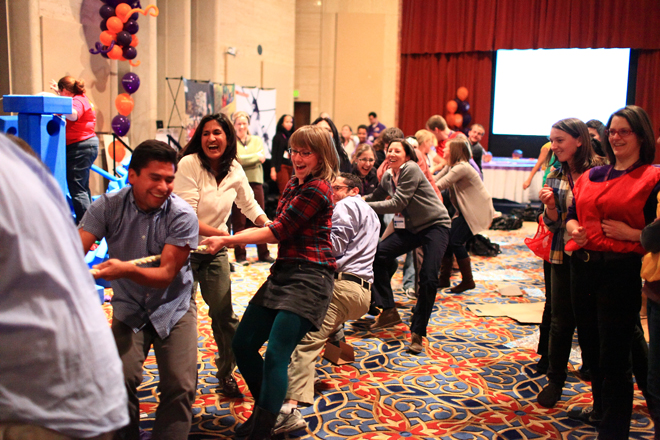Here’s another idea I got from Rob Poynton, whose book I read on a train from London to Paris. (He lives off the grid in Spain and writes/blogs about a lot of issues related to making work more enjoyable and productive, including the idea of improv sessions for organizations.)
So here’s an interesting concept: you can point to different times in a person’s life where the notion of “engaging in play” ends, but almost all of the possible spots occur before the age of 23. In fact, if you’re out there at 25/26 messing around and looking purposeless, most people start viewing you as a deadbeat or someone with no arc/track/story (unless you have a trust fund, in which case people envy the shit out of you). There’s a dividing line somewhere — be it high school, college, or immediately post-college — where the idea is that you stop playing and start working. This could come from the concept that “work is a virtue,” which is a whole different post. (In fact, it almost assuredly does come from that idea.)
But adults are still human beings, and human beings want to play. Play is a natural expression of who we are inside, writ large. (Have you ever seen a woman in her 40s, with three children under 12, on Halloween? Adults like to play.)
Articles about “the importance/value” of adult play abound on the Internet — here and here as two examples — so other people are thinking about this.
There’s one key thing I always come back to, though.
Play essentially frees the mind. That’s what it does when you’re a child. You can open up new channels of thought because you’re not so focused on one thing, and you can learn how to socialize better in the process. Those are literally essential skills for adults, and especially for adults in the workforce. Instead, this is what most adults get in the standard middle-class existence:
- Meetings
- Busy Busy Busy
- Fire off those e-mails
- Push Push Push; don’t stop and think
- “Respect is something that needs to be scheduled”
- Go Home/Happy Hour/Event
- Dinner
- Entertainment
- Sex/No Sex
- Sleep
- Rinse and repeat
There’s not a lot of room for “play” in that equation, and most people I know (legitimate adults, which is a sub-section I don’t necessarily belong to) follow a similar script as to the above (depends on if you have kids; that’s the biggest dividing line) and use Saturday/Sunday as their “play” day, but even then … “play” becomes an activity along the lines of “attending a structured event somewhere” or “doing errands.”
Move it off broader life and apply it just to work. Why don’t we have stop-and-play periods at work? The basic answer is simple: it’s viewed as immature, or something children would do. We’re grown adults, out here making money and slaying dragons! We put our heads down and do virtuous work! We don’t have time for trifling things like play!
All well and good, but consider the flip side: childhood is, for most people, associated with joy. I don’t mean your childhood was joyous — everyone’s childhood was a fucking wreck of some level, hence why therapists have nicer houses than you do — but I mean if you see a child, all innocent and learning and growing and putting things together, most people can’t help but smile.
How is the child doing a lot of that?
Through play.
I understand the ideas of “adulthood” and “maturity” and the like — “understand” is a different concept than “follow through with” — but I don’t understand why adults can’t “play” more. Think about something as basic as Silicon Valley. I think the idea of Silicon Valley having “great culture” might be a stretch, but it’s hard to argue that the attitude you get from the news media on it is “fun” and “play.” (Zany conference rooms! Cereal all-day! Kids in sweatshirts!)
Silicon Valley makes a ton of money, all told.
Causation? Good Lord no. Correlation? Perhaps.
Flip side: finance industry is very much work-driven (although when they play, they play hard), and they make a ton of money too.
It is what it is, I guess.
My broader point is this: just because a person turns from 21 to 22, or graduates from a program, or goes to high school instead of junior high … that’s not enough of a demarcation line whereby they want to stop playing and exploring and want to, instead, put their head down and just start grinding on shit.
So whether it’s improv or comedy sessions or work breaks to do zany things, or whatever the case may be … let’s interject some “play” back into the idea of “work.” It might make the ideas fly and flow more creatively — or, at the very least, more creatively than it would running from meeting to meeting to e-mail to conference call to e-mail to meeting to your car, you know?
